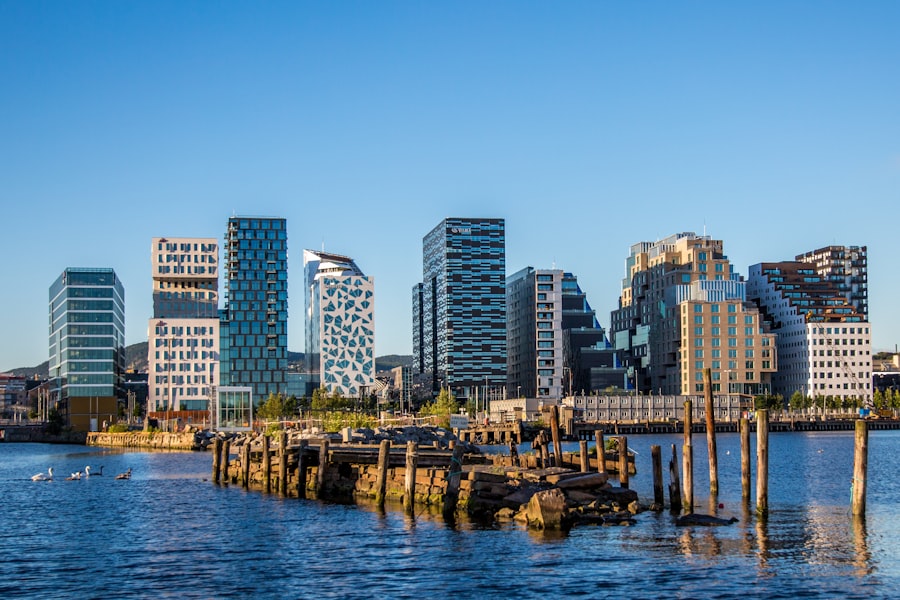Norway is often heralded as one of the most business-friendly countries in the world, characterised by a stable economy, a high standard of living, and a robust welfare system. The nation boasts a diverse economy, with key sectors including oil and gas, shipping, seafood, and technology. This economic diversity not only provides a wealth of opportunities for entrepreneurs but also fosters a competitive landscape that encourages innovation and sustainability.
The Norwegian government actively supports business development through various initiatives, making it an attractive destination for both local and foreign investors. Moreover, Norway’s strategic location in Northern Europe offers easy access to both European and Arctic markets. The country is known for its strong emphasis on environmental sustainability, which is increasingly becoming a priority for businesses worldwide.
Entrepreneurs looking to establish themselves in Norway will find a supportive ecosystem that values ethical practices and corporate social responsibility. Understanding these dynamics is crucial for anyone considering starting a business in this Scandinavian nation. Take the first step. Book a consultation with the Norway Relocation Group for your move to Norway. https://norwayrelocation.no/one-hour-strategy-session/
Summary
- Norway has a stable and transparent business environment with a strong focus on innovation and sustainability.
- Legal requirements for starting a business in Norway include registering with the Brønnøysund Register Centre and obtaining necessary permits and licenses.
- When choosing the right business structure in Norway, consider factors such as liability, taxation, and administrative requirements.
- Registering your business in Norway involves obtaining a Norwegian business number, opening a bank account, and registering for VAT if applicable.
- Understanding taxation and financial obligations in Norway is crucial, including corporate tax, VAT, and social security contributions.
Legal Requirements for Starting a Business in Norway
Starting a business in Norway involves navigating a series of legal requirements that are designed to ensure compliance with national regulations. The first step is to determine the type of business entity you wish to establish, as this will dictate the legal obligations you must fulfil. Common structures include sole proprietorships, limited liability companies (AS), and partnerships.
Each structure has its own set of legal requirements, including registration processes and capital requirements. Once you have chosen your business structure, you must register your company with the Brønnøysund Register Centre, which is the central registry for businesses in Norway. This process typically requires submitting various documents, including your business plan, articles of association, and identification details of the owners.
Additionally, you may need to obtain specific permits or licenses depending on your industry. It is advisable to consult with legal experts or local business advisors to ensure that you meet all necessary legal obligations before launching your venture.
Choosing the Right Business Structure

Selecting the appropriate business structure is a critical decision that can significantly impact your operations and financial liabilities. In Norway, the most common forms of business entities include sole proprietorships (enkeltpersonforetak), limited liability companies (aksjeselskap or AS), and partnerships (ansvarlig selskap). Each structure has its advantages and disadvantages, which should be carefully considered based on your business goals and risk tolerance.
A sole proprietorship is the simplest form of business entity, ideal for individual entrepreneurs who wish to maintain full control over their operations. However, it also exposes the owner to unlimited personal liability for business debts. On the other hand, a limited liability company (AS) offers protection against personal liability, meaning that owners are only liable for the company’s debts up to their investment in the business.
This structure is often preferred by those seeking to attract investors or expand their operations. Ultimately, the choice of business structure should align with your long-term vision and operational needs.
Registering Your Business in Norway
The registration process for businesses in Norway is relatively straightforward but requires careful attention to detail. To begin, you must gather all necessary documentation, including your business plan, identification documents, and any relevant permits or licenses. Once you have compiled these materials, you can submit your application online through the Brønnøysund Register Centre’s website.
Upon successful registration, you will receive a unique organisation number that identifies your business within the Norwegian system. This number is essential for tax purposes and will be required when opening a bank account or entering into contracts. It is important to note that certain industries may have additional registration requirements or regulations that must be adhered to.
Therefore, it is prudent to conduct thorough research or seek professional guidance to ensure compliance with all applicable laws.
Understanding Taxation and Financial Obligations
Navigating the taxation landscape in Norway is crucial for any entrepreneur looking to establish a successful business. The Norwegian tax system is characterised by relatively high tax rates compared to other countries; however, it also provides extensive public services and infrastructure that benefit businesses and citizens alike. Corporate tax rates are currently set at 22%, which applies to profits generated by limited liability companies.
In addition to corporate taxes, businesses must also consider value-added tax (VAT), which is levied on most goods and services at a standard rate of 25%. Certain goods and services may be subject to reduced rates or exemptions. Furthermore, employers are responsible for withholding taxes from employee salaries and contributing to social security schemes.
Understanding these financial obligations is essential for maintaining compliance and ensuring the long-term viability of your business in Norway.
Finding Funding and Support for Your Business

Securing funding is often one of the most significant challenges faced by new entrepreneurs. In Norway, there are various avenues available for obtaining financial support, ranging from government grants and loans to private investors and venture capital firms. The Norwegian government offers several funding programmes aimed at fostering innovation and entrepreneurship, particularly in sectors such as technology and renewable energy.
Additionally, local banks and financial institutions provide various loan options tailored to small businesses. Entrepreneurs can also explore crowdfunding platforms as an alternative means of raising capital. Networking with other business owners and attending industry events can provide valuable insights into potential funding sources and investment opportunities.
It is essential to develop a comprehensive business plan that clearly outlines your financial needs and growth projections to attract potential investors.
Hiring Employees in Norway
When it comes to building a successful team in Norway, understanding the local labour market and employment laws is paramount. The country has a highly skilled workforce, with a strong emphasis on education and vocational training. As an employer, you will need to comply with various regulations regarding hiring practices, employee rights, and workplace safety.
Norwegian labour laws are designed to protect employees’ rights, including regulations on working hours, minimum wage, and holiday entitlements. It is essential to familiarise yourself with these laws to ensure compliance and foster a positive work environment. Additionally, offering competitive salaries and benefits can help attract top talent in a competitive job market.
Building a diverse and inclusive workplace culture will not only enhance employee satisfaction but also contribute to your company’s overall success.
Navigating Cultural and Language Differences
Cultural awareness plays a significant role in successfully conducting business in Norway. Norwegians value transparency, equality, and direct communication; therefore, it is essential to approach business interactions with respect for these cultural norms. Building relationships based on trust and mutual respect is crucial for establishing long-term partnerships.
Language can also be a barrier for non-Norwegian speakers; however, many Norwegians are proficient in English, particularly in urban areas. Nevertheless, making an effort to learn basic Norwegian phrases can demonstrate your commitment to integrating into the local culture and can help foster goodwill among potential clients and partners. Engaging with local communities and participating in cultural events can further enhance your understanding of Norwegian customs and practices.
Marketing and Promoting Your Business in Norway
Effective marketing strategies are vital for gaining visibility and attracting customers in Norway’s competitive market landscape. Digital marketing has become increasingly important as more consumers turn to online platforms for information and shopping. Establishing a strong online presence through social media channels, search engine optimisation (SEO), and targeted advertising can significantly enhance your brand’s visibility.
Additionally, understanding your target audience’s preferences and behaviours is essential for crafting effective marketing campaigns. Conducting market research can provide valuable insights into consumer trends and help tailor your messaging accordingly. Collaborating with local influencers or participating in community events can also boost brand awareness and foster connections within the community.
Understanding Business Etiquette and Networking in Norway
Business etiquette in Norway is characterised by professionalism and respect for personal space. Punctuality is highly valued; therefore, arriving on time for meetings is essential. Norwegians tend to favour straightforward communication styles; thus, being direct yet polite in your interactions will be appreciated.
Networking plays a crucial role in building relationships within the Norwegian business community. Attending industry conferences, trade shows, or local networking events can provide valuable opportunities to connect with potential partners or clients. Building rapport through informal gatherings or social events can also enhance professional relationships over time.
Expanding Your Business in the Norwegian Market
Once you have established your business in Norway, you may consider expanding your operations further within the market or even into neighbouring countries. Conducting thorough market research will help identify potential growth opportunities while assessing competition and consumer demand. Leveraging local partnerships can facilitate expansion efforts by providing insights into regional markets and consumer preferences.
Additionally, utilising resources such as the Norwegian Business Association or local chambers of commerce can offer valuable support during this process. For those looking to deepen their understanding of the Norwegian market or improve their communication skills within this context, enrolling in Norwegian language courses at the NLS Norwegian Language School in Oslo can be immensely beneficial. These courses are designed not only to teach the language but also to immerse students in Norwegian culture and business practices.
By enhancing language proficiency through structured learning at NLS, entrepreneurs can navigate the complexities of the Norwegian market more effectively while building stronger relationships with clients and partners alike. In conclusion, starting and growing a business in Norway presents numerous opportunities alongside unique challenges. By understanding the legal landscape, cultural nuances, and effective marketing strategies while also investing in language skills through reputable institutions like NLS Norwegian Language School, entrepreneurs can position themselves for success in this vibrant market.
Learn more about the Norwegian classes at the NLS Norwegian Language School in Oslo

